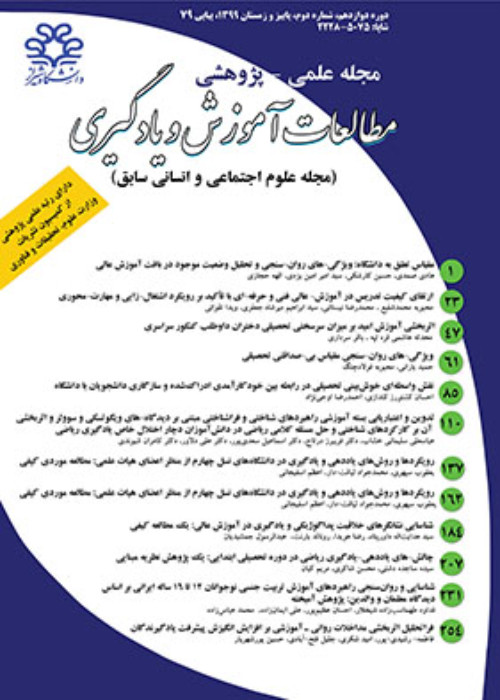The Quest for Meaning and the Basis of Dialogue in P4C: An Attempt to Develop a Theory of Dialogic Teaching and Learning
Author(s):
Article Type:
Research/Original Article (دارای رتبه معتبر)
Abstract:
Introduction From the outset, P4C?s dialogical foundations were rested upon Socrates method as well as Vygotsky?s developmental concepts of internalization and zone of proximal development. However, there are new rounds of philosophical and psychological critiques, embraced also by the P4C program, interrogating both Socrates dialogical method and Vygotsky?s aforementioned concepts. That is why some scholars of P4C suggest Bakhtinian dialogue as the last alternative for dialogical foundations of P4C.
Method As far as the method is concerned, this investigation uses the speculative essay as suggested by William. H. Schubert (1991). In a philosophical essay, the essayist wonders, ponders, questions, theorizes, speculates, philosophizes and projects the imagination in an attempt to combine and modify preexisting ideas in a special way. This speculative attitude of philosophical essay makes it also a speculative essay. (Izuegbu, 2011: p 25). Schubert (1991) believes essay is a record of the author speculating and theorizing? one must remember that the essay is a portrayal of the author?s way of reflecting. It is, thus a form of philosophical inquiry put in to writing. (pp 65-66).
Discussion and Conclusions After raising criticisms to Socrates, Vygotsky and Bakhtin?s approaches to dialogue, we explored an alternative avenue for the dialogical foundations of community of philosophical inquiry (CPI) drawing on decentration theory that can also provide a point of departure for developing a dialogical theory of teaching and learning. In light of this theory, dialogue has two characteristics: firstly, one can consider monologue and dialogue as existing on a continuum, at any point of which, an event fused with ?monologue and dialogue? is passing through. And secondly, identical to monologue and dialogue, dialectics and dialogue are relatively fused at any point. Therefore, what happens in a community of learning is a vacillation between different points of view, that traverse along the same path of vacillation between centration and decentration. Furthermore, this theory holds promise for reconsidering shortcomings of Vygotsky?s internalization and zone of proximal development as psychological foundations of dialogue in CPI. As such, regarding decentration theory, concepts of ?making one?s own? and ?zone of proximal dialogue? are superseded by those of vygotsky?s. The most challenging problem with Vygotsky?s concept of internalization is abolition of decentration in the process of vacillation between centration and decentration. Dominance of parents and teachers? voice as the first voice over the second voice, namely that of the child, student or trainee is the target of some criticisms Vygotsky?s ZPD faces today.
Method As far as the method is concerned, this investigation uses the speculative essay as suggested by William. H. Schubert (1991). In a philosophical essay, the essayist wonders, ponders, questions, theorizes, speculates, philosophizes and projects the imagination in an attempt to combine and modify preexisting ideas in a special way. This speculative attitude of philosophical essay makes it also a speculative essay. (Izuegbu, 2011: p 25). Schubert (1991) believes essay is a record of the author speculating and theorizing? one must remember that the essay is a portrayal of the author?s way of reflecting. It is, thus a form of philosophical inquiry put in to writing. (pp 65-66).
Discussion and Conclusions After raising criticisms to Socrates, Vygotsky and Bakhtin?s approaches to dialogue, we explored an alternative avenue for the dialogical foundations of community of philosophical inquiry (CPI) drawing on decentration theory that can also provide a point of departure for developing a dialogical theory of teaching and learning. In light of this theory, dialogue has two characteristics: firstly, one can consider monologue and dialogue as existing on a continuum, at any point of which, an event fused with ?monologue and dialogue? is passing through. And secondly, identical to monologue and dialogue, dialectics and dialogue are relatively fused at any point. Therefore, what happens in a community of learning is a vacillation between different points of view, that traverse along the same path of vacillation between centration and decentration. Furthermore, this theory holds promise for reconsidering shortcomings of Vygotsky?s internalization and zone of proximal development as psychological foundations of dialogue in CPI. As such, regarding decentration theory, concepts of ?making one?s own? and ?zone of proximal dialogue? are superseded by those of vygotsky?s. The most challenging problem with Vygotsky?s concept of internalization is abolition of decentration in the process of vacillation between centration and decentration. Dominance of parents and teachers? voice as the first voice over the second voice, namely that of the child, student or trainee is the target of some criticisms Vygotsky?s ZPD faces today.
Keywords:
Language:
Persian
Published:
Studies in Learning & Instruction, Volume:10 Issue: 1, 2018
Pages:
55 to 93
magiran.com/p1879794
دانلود و مطالعه متن این مقاله با یکی از روشهای زیر امکان پذیر است:
اشتراک شخصی
با عضویت و پرداخت آنلاین حق اشتراک یکساله به مبلغ 1,390,000ريال میتوانید 70 عنوان مطلب دانلود کنید!
اشتراک سازمانی
به کتابخانه دانشگاه یا محل کار خود پیشنهاد کنید تا اشتراک سازمانی این پایگاه را برای دسترسی نامحدود همه کاربران به متن مطالب تهیه نمایند!
توجه!
- حق عضویت دریافتی صرف حمایت از نشریات عضو و نگهداری، تکمیل و توسعه مگیران میشود.
- پرداخت حق اشتراک و دانلود مقالات اجازه بازنشر آن در سایر رسانههای چاپی و دیجیتال را به کاربر نمیدهد.
In order to view content subscription is required
Personal subscription
Subscribe magiran.com for 70 € euros via PayPal and download 70 articles during a year.
Organization subscription
Please contact us to subscribe your university or library for unlimited access!


